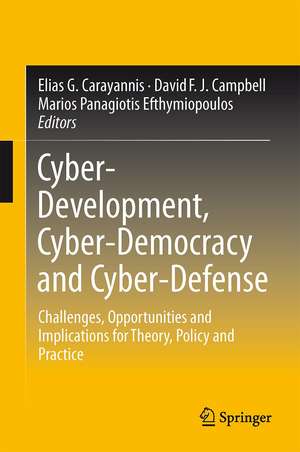Cyber-Development, Cyber-Democracy and Cyber-Defense: Challenges, Opportunities and Implications for Theory, Policy and Practice
Editat de Elias G. Carayannis, David F. J. Campbell, Marios Panagiotis Efthymiopoulosen Limba Engleză Hardback – 15 aug 2014
Integrating theoretical frameworks, empirical research and case studies, the editors and contributors have organized the chapters into three major sections, focusing on cyber-development, cyber-democracy and cyber-defense.
The authors define cyber-development as a set of tools, methodologies and practices that leverage ICT to catalyze and accelerate social, political and economic development, with an emphasis on making the transition to knowledge-based economies. One underlying understanding here is that knowledge, knowledge creation, knowledge production and knowledge application (innovation) behave as crucial drivers for enhancing democracy, society, and the economy. By promoting dissemination and sharing of knowledge, cyber-democracy allows a knowledge conversion of the local into the global (gloCal) and vice versa, resulting in a gloCal platform for communication and knowledge interaction and knowledge enhancement. Meanwhile, technology-enabled interconnectivity increases the need to adopt new methods and actions for protection against existing threats and possible challenges to emerge in the future. The final section contemplates themes of cyber-defense and security, as well as emerging theories and values, legal aspects and trans-continental links (NATO, international organizations and bilateral relations between states). Collectively, the authors present a uniquecollection of insights and perspectives on the challenges and opportunities inspired by connectivity.
| Toate formatele și edițiile | Preț | Express |
|---|---|---|
| Paperback (1) | 644.18 lei 6-8 săpt. | |
| Springer – 22 sep 2016 | 644.18 lei 6-8 săpt. | |
| Hardback (1) | 650.37 lei 6-8 săpt. | |
| Springer – 15 aug 2014 | 650.37 lei 6-8 săpt. |
Preț: 650.37 lei
Preț vechi: 765.14 lei
-15% Nou
Puncte Express: 976
Preț estimativ în valută:
124.46€ • 129.46$ • 102.75£
124.46€ • 129.46$ • 102.75£
Carte tipărită la comandă
Livrare economică 14-28 aprilie
Preluare comenzi: 021 569.72.76
Specificații
ISBN-13: 9781493910274
ISBN-10: 1493910272
Pagini: 372
Ilustrații: XV, 354 p. 39 illus., 25 illus. in color.
Dimensiuni: 155 x 235 x 27 mm
Greutate: 0.69 kg
Ediția:2014
Editura: Springer
Colecția Springer
Locul publicării:New York, NY, United States
ISBN-10: 1493910272
Pagini: 372
Ilustrații: XV, 354 p. 39 illus., 25 illus. in color.
Dimensiuni: 155 x 235 x 27 mm
Greutate: 0.69 kg
Ediția:2014
Editura: Springer
Colecția Springer
Locul publicării:New York, NY, United States
Public țintă
ResearchCuprins
From Development as Democracy to Innovation as Development.- E-Development and Knowledge Economy: The Role of ICT and SME Incubation.- Addressing the Impact of E-Development in the Knowledge Economy and Society: Outputs, Outcomes and Impacts.- Explaining and Comparing Quality of Democracy in Quadruple Helix Structures.- The Effects of Cyber democracy on the Middle East: Egypt and Iran.- Democratization in the Middle East and North Africa: Tunisia, Egypt and Turkey.- Cyber Democracy: The Future of Democracy?.- Cyber Democracy and Cyber Crime: Two Sides of the Same Coin.- "Creating" a Public Sphere in Cyber Space: The Case of the EU.- Cyber Power and the State.- Cyber security in Europe: Cooperation and Investment.- NATO’s Cyber Defense as Methodology for Smart Defense.- The Security Culture of a Global and Multileveled Cyber Security.- The Relevance of Endpoint Security in Enterprise Networks.
Textul de pe ultima copertă
In this volume, contributors from academia, industry, and policy explore the inter-connections among economic development, socio-political democracy, and defense and security in the context of a profound transformation, spurred by globalization and supported by the rapid development of information and communication technologies (ICT). This powerful combination of forces is changing the way we live, and redefining the way companies conduct business and national governments pursue strategies of innovation, economic growth, and diplomacy.
Integrating theoretical frameworks, empirical research, and case studies, the editors and contributors have organized the chapters into three major sections, focusing on cyber-development, cyber-democracy, and cyber-defense.
The authors define cyber-development as a set of tools, methodologies, and practices that leverage ICT to catalyze and accelerate social, political, and economic development, with an emphasis on making the transition to knowledge-based economies. One underlying understanding here is that knowledge, knowledge creation, knowledge production and knowledge application (innovation) behave as crucial drivers for enhancing democracy, society, and the economy. By promoting dissemination and sharing of knowledge, cyber-democracy allows a knowledge conversion of the local into the global (gloCal) and vice versa, resulting in a gloCal platform for communication and knowledge interaction and knowledge enhancement. Meanwhile, technology-enabled interconnectivity increases the need to adopt new methods and actions for protection against existing threats and possible challenges to emerge in the future. The final section contemplates themes of cyber-defense and security, as well as emerging theories and values, legal aspects, and trans-continental links (NATO, international organizations, and bilateral relations between states). Collectively, the authors present aunique collection of insights and perspectives on the challenges and opportunities inspired by connectivity.
Integrating theoretical frameworks, empirical research, and case studies, the editors and contributors have organized the chapters into three major sections, focusing on cyber-development, cyber-democracy, and cyber-defense.
The authors define cyber-development as a set of tools, methodologies, and practices that leverage ICT to catalyze and accelerate social, political, and economic development, with an emphasis on making the transition to knowledge-based economies. One underlying understanding here is that knowledge, knowledge creation, knowledge production and knowledge application (innovation) behave as crucial drivers for enhancing democracy, society, and the economy. By promoting dissemination and sharing of knowledge, cyber-democracy allows a knowledge conversion of the local into the global (gloCal) and vice versa, resulting in a gloCal platform for communication and knowledge interaction and knowledge enhancement. Meanwhile, technology-enabled interconnectivity increases the need to adopt new methods and actions for protection against existing threats and possible challenges to emerge in the future. The final section contemplates themes of cyber-defense and security, as well as emerging theories and values, legal aspects, and trans-continental links (NATO, international organizations, and bilateral relations between states). Collectively, the authors present aunique collection of insights and perspectives on the challenges and opportunities inspired by connectivity.
Caracteristici
Explores the ways in which interconnections among economic development, socio-political democracy and security redefine the ways in which governments, businesses, academia and other institutions pursue strategies of innovation and growth Considers the role of information and communications technology (ICT) in promoting dissemination of knowledge in both local and global contexts Features contributions from an international array of scholars, practitioners and policymakers integrating theory, empirical research and case studies
















